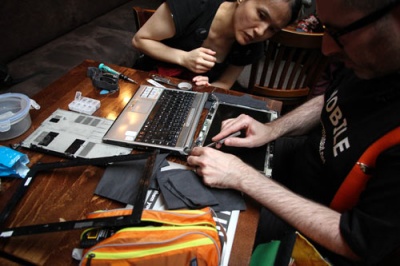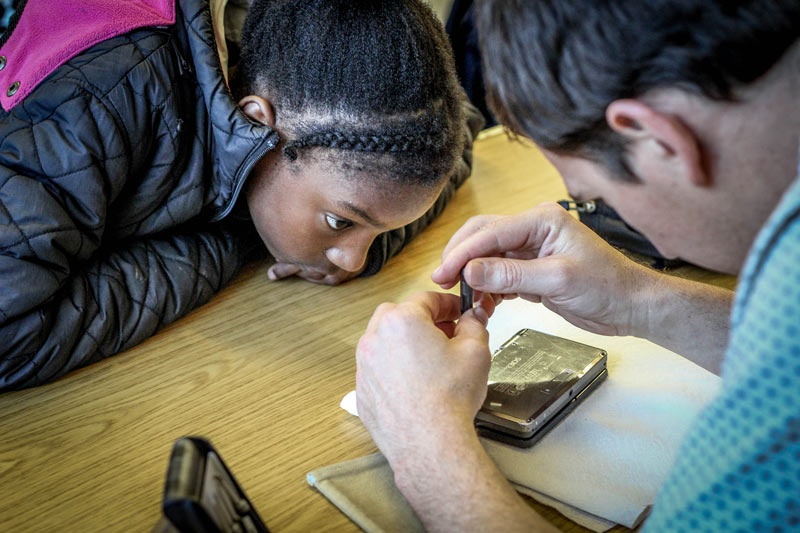The Restart Project: Repair in the community
The Restart Project is bringing the circular economy to the grass roots, with community repair events helping people fix their technology and build skills, confidence and networks. Resource spoke to Co-Founder Janet Gunter to find out more
When The Restart Project's co-founders Janet Gunter and Ugo Vallauri returned to London after working with communities in developing countries, they noticed the difference in approaches to technology. The cultural attitude of communities they had worked in, where nothing was ever wasted, gave the two a new perspective on the UK public’s relationship with electronics. The Restart Project was born.

The project, which started as a back- garden community repair session, grew rapidly, says Gunter, revealing “a huge interest in repair, not just from frustrated owners of technology, but also all the people in every community who quite like to tinker and have really great skills to share”.
The project now runs two monthly three-hour Restart Parties (named to reflect their fluid and spontaneous nature) in North and South London that attract about 35 people, and also provides guidance on things like risk, liability and recruiting volunteers for those looking to host similar community events elsewhere.
Since the first Restart Party in 2012, almost 4,000 participants have attended over 200 parties across eight countries, aided by over 5,300 hours of volunteer time, mainly from talented amateurs with an interest in tinkering.
People come to the parties for different reasons, Gunter says: “Some love to learn from each other, some feel outraged by the inequalities that are built into our consumer culture, others are very concerned about the environment, but I think what unites everyone is the social experience of doing something together, feeling useful and sharing skills.”

Gunter explains that the community aspect is a key part of improving behaviour around resources, and one that is often overlooked: “One of the things that the resources industry and politicians miss most is that there’s as real human aspect to this. It’s very important to recognise that resource efficiency really naturally occurs when we create a social space for it, so we cannot just sit back and count kilos and tonnes.
“[It] obviously matters to us how much we save from landfill – we’re concerned with the volumes that we can push up the waste hierarchy – but what leads people to do that is so often a combination of social and environmental motivations.”
The parties welcome a mixed demographic, with people often bringing kids to weekend events, and everyone is encouraged to watch repairs and get hands-on experience helping to disassemble and fix a variety of gadgets. Laptops are the most common devices, but Gunter notes that a panoply of appliances gets brought in. “We get loads of mobiles and headphones. Kitchen appliances are also quite common because people don’t think they should be breaking after one or two years.”
Volunteers are on hand to assist with both hardware and software issues: “Oftentimes we’ll get digital literacy issues, where people will come in with poor configuration of the gadget and need to be shown how to use it. Software is often a make-or-break situation. If you’re frustrated and can’t figure out a certain kind of configuration or can’t get online, that essentially renders the device useless for the user.”
Gunter says that around half of the items that are brought in get fixed at the same party, with half of the rest being designated as end-of-life and the other half receiving advice on what needs to be done, “often sourcing a spare part or taking it to a professional”, but the community that is created means that dialogue between volunteers and party-goers often continues after the event.

In addition to its regular parties, the group produces a monthly ‘Restart Radio’ podcast and weekly radio show to spread the word about repair, and hosts a wiki that offers tips and in-depth how-tos that can be uploaded by anyone, providing a one-stop shop for at-home DIY repair. The project is also developing material for teachers to promote repair in secondary enrichment curriculums, “catching [people] before they’ve become megaconsumers but when they’re old enough to hold a screwdriver with some confidence”.
To better understand what draws people to Restart Parties and repair events, the project is working with Nottingham Trent University to investigate how people relate to their products. Early findings from the research suggest that 53 per cent of those surveyed at events said that they were slightly or not-at-all confident about undertaking repairs at home, with knowldge, skills and confidence cited as the major barriers for not attempting more DIY fixes on their gadgets.
 This article was taken from Issue 87
This article was taken from Issue 87But away from self-repair, a surprising 49 per cent of respondents said that they could not name a commercial repair company that they trust. While providing the confidence, skills, tools and time to everyone with a bit of faulty technology might not be possible, for a circular and more efficent economy to exist we must surely be making trustworthy sources of repair available and known to the public? The study also found that consumers want to find new homes for their equipment when they've finished with it. 82 per cent said they looked for people to reuse their products when they no longer required them.
The project is developing a map of repair businesses in London to encourage people to seek them out. Gunter emphasises: “We’d like to make the link with commercial repair – we’re absolutely not trying to undermine it. In fact, we’re trying to stimulate demand for commercial repair and thinking about how to grow the repair economy.
Gunter says that understanding how people view their gadgets is key to establishing how we can create sustainable business models and practices in the future, and that the circumstances of the users, who have a pivotal role in the creation and prevention of waste, must be better appreciated: “If we are in the age of measuring impacts very scientifically and documenting everything and value for money and so on, we really need to understand that the human social parts are valuable and we need to understand how they relate to economic value and the bottom line and environmental concerns. That would be my plea to the sector and politicians and regulators.”
More information about the Restart Project can be found at therestartproject.org.






